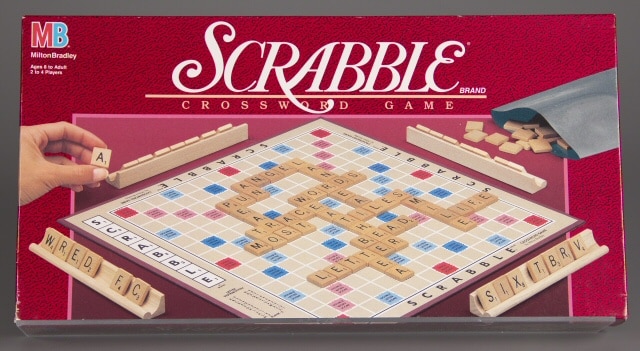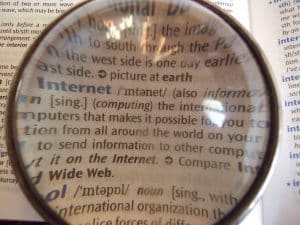 While on vacation and passing through a park recently, a Scrabble game in progress at a picnic table caught my eye and then my ear. I heard a cackle from the two players who, along with a companion, were celebrating a triple score. “What’s the word?” I asked. Still chuckling, the three chimed in with “bedutch.” The wily player had scored another 15 points because he augmented the 11-point “Dutch” with the “be” prefix. When I told them that I was pretty sure nobody had ever played the word “bedutch” in a game of Scrabble (or used it in any other context as a matter of act), they invited me to sit with them as back-up kibitzer. Admiring the impish stroke, I accepted the honor. Really, “bedutch”?
While on vacation and passing through a park recently, a Scrabble game in progress at a picnic table caught my eye and then my ear. I heard a cackle from the two players who, along with a companion, were celebrating a triple score. “What’s the word?” I asked. Still chuckling, the three chimed in with “bedutch.” The wily player had scored another 15 points because he augmented the 11-point “Dutch” with the “be” prefix. When I told them that I was pretty sure nobody had ever played the word “bedutch” in a game of Scrabble (or used it in any other context as a matter of act), they invited me to sit with them as back-up kibitzer. Admiring the impish stroke, I accepted the honor. Really, “bedutch”?
Later, with no Internet accessible at the cottage, I pulled a fat dictionary off the shelf. I’d have preferred the massive Webster’s Third International for the task, or even better, its more definitive predecessor, Webster’s Second. But either might have seemed too much like work, and for playing with words on holiday, The Reader’s Digest Great Encyclopedic Dictionary, a grocery-store promotional item from 1966, would do just fine. And sure enough, I found the word “bedutch” in it. It didn’t mean “going Dutch” as I had deduced; it meant “to Germanize” or to “Dutchify.” The entry noted, predictably, that the word is “obsolete.”
In those pages I found a list of several dozen words that began with “be,” an Old English prefix that carried several senses. This got me wondering about “be.” When taken to mean around or throughout, the prefix yields “beclothe” and “bewreathe.” If used in the sense of “thoroughly,” English vocabulary comes up with “befuddle” and “bethump.” (Zounds! I was never so bethump’d with words since I first called my brother’s father Dad.) When the sense is “to make” the prefix gives us “bedutch,” “benumb” and even “beclown,” a word so obscure that, in fact, I could not find it anywhere else in the 2,000 pages of The Reader’s Digest Great Encyclopedic Dictionary.
Though these words might come in handy in Scrabble, I detected a wiff of fusty ceremony arising from them. Even in this age of over-reporting, when every celebrity’s misstep is relayed as news, we might still hear that someone’s reputation has been besmirched. But the root verb, “to smirch” or “to begrime,” no longer rings with any familiarity. The all-purpose “bling” has now replaced “bejeweled.” We say “decked-out” instead of “beribboned.” “Berobed” might survive in a romance novel of the bodice-ripper genre, but you won’t find it in a television commercial script. And I’ve since discovered that to be “beclowned” means to be “besotted–drunk with love,” or as some might tweet these days, so foolishly smitten as to be “twitterpated.” 
Still, I enjoy rambling through these old words; sometimes they bring back not just the sense of old associations but old sensibilities, too. And historians, like me, are always looking beyond the sense of old words for the sensibilities of the people who used them. In this service the dictionary is a tool of the trade.
But in the service of play, like this ramble through now amusing “be” words—beshamed and befreckled, beruffled and bewiskered, bewitched and bewildered, the dictionary becomes a toy of the trade. If a toy is “that object which enables play,” for me the dictionary joins the jump rope, crayons, kites, bikes, yo-yos, baseball mitts, Frisbees, and sleds, roller skates, ray guns, Rubik’s Cubes, and a thousand other things that engage a player’s mind and body.
In fact, in the case of Scrabble, players of the game have their own official dictionary, a compilation of 120,000 officially sanctioned, playable words to referee the contest. In international tournaments, far keener than the companionable game at the park that invited me in, many of these players will have memorized every single one of these words. It defies the imagination to note that some of the competitors speak no English and will know you’re bluffing if you play the word “piltner.”
Thinking about the dictionary as a toy, I checked The Reader’s Digest Great Encyclopedic Dictionary for a definition of the word “toy,” and found that I’ve got a bone to pick with the compilers. A toy, they noted, is “an article constructed for the amusement of children; a plaything,” and so far good enough. But they added, gratuitously, that at toy is “any object of little importance or value; a trifle.”
Instead, at The Strong we find that toys are profound documents that show how we both lose ourselves when at play and how we find ourselves in play. Play helps us show our stuff and discover who we are (even if the skill at play in competition is wordplay). In this respect, play is as important a human state and quite the equal of love and work in shaping the self. Looking back at play as historians do will reveal not just our playthings themselves, but, when we’re lucky, the successive “selves” and the forgotten values of the American past. And so, even if the dictionary will regard toys as trivial, I’ll say it again, at this museum we don’t trifle with play.
 Hours 10 a.m.–5 p.m. | Fri. & Sat. till 8 p.m.
Hours 10 a.m.–5 p.m. | Fri. & Sat. till 8 p.m.